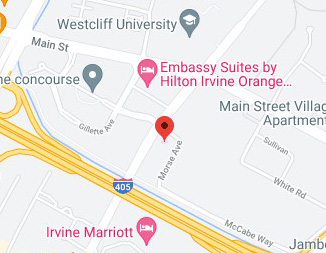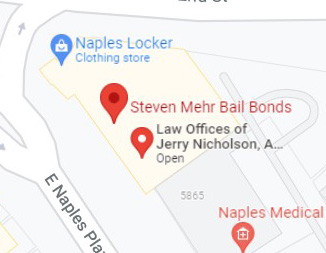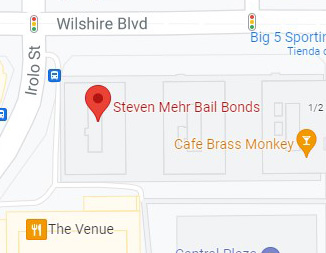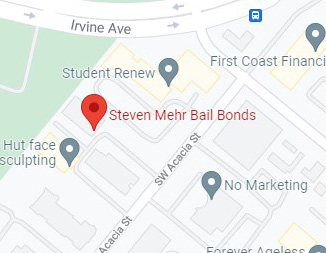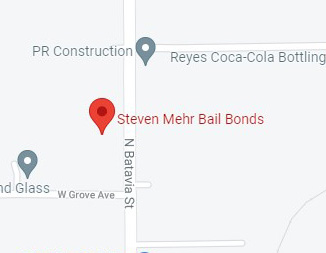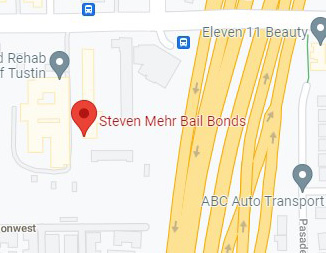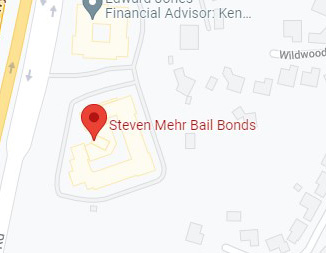Securing a person's release from jail can be an expensive affair. Even though the California bail system enables people to walk free pending the trial of the cases, sometimes the bail amount is set so high that most can't afford it. For instance, the judge may order that a defendant pay $5,000 bail before being released. Understandably, most people do not have thousands of dollars just lying around waiting for when they're arrested so they can post bail. At Steven Mehr Bail Bonds, we understand this, and that's why we are offering to help you secure your release to return to your chores as you await trial. If you've been arrested in Hawthorne, CA, contact our bail bond agents, who will start working on your case right away and ensure you are released as soon as possible.
What Happens After You Are Arrested?
After you’ve been arrested in Hawthorne, CA, you’ll be taken to Hawthorne police station/jail for booking. Booking is the process whereby info about an arrestee is keyed into the jail or police station system. Precise procedures vary from one jurisdiction to the other, but most have similar features. Generally, in Hawthorne, the arresting officer will record your fingerprints, take your mug shots (photographs), and take your personal details, including your name, address, phone number, and the offense you're alleged to have committed. Additionally, the officer will search through databases to see whether you have any outstanding warrants.
The arresting officer will also take all of your personal effects, including clothing, and search you for any weapon or contraband. The authorities will hold onto your personal effects until your release unless the item is illegal or it's proof of the supposed criminal offense. You'll then be given a uniform that you'll wear until your release. Medical screening is also performed to ensure there aren't any immediate health threats to either you or any person you may encounter. Lastly, you're detained until you post bail or someone else does it on your behalf or until your trial ends and you are not guilty.
Bail Setting
After booking, the judge will set bail. Bail is the money a defendant pays to the court or jail facility to guarantee that they will make all court appearances if released pending trial.
In the U.S justice system, there's what we call the presumption of innocence. Put otherwise; every individual is deemed innocent until proven guilty. This means that technically, the government should not hold an individual in prison or jail before they have officially been found guilty of an offense.
Thus, you are still deemed innocent before the law until your trial date, and therefore have the legal right to your freedom. And since the government has to be sure that you'll appear for your trial, this is where bail comes in.
Sometimes you may not need to post bail. If circumstances allow, you may be released on your own recognizance (own recognizance or O.R release). With O.R release, you are only required to sign a written promise to attend court as required. However, all other bail aspects remain unchanged. That is, the judge can order that you abide by certain conditions if you're released O.R just like if you were released on bail. These conditions may include checking in regularly with a probation officer and abstaining from alcohol or drug use. And if you fail to appear in court as required after an O.R release, the judge may order your arrest, just like it would happen if you had posted bail.
Factors that may make the judge release you on your own recognizance include your good prior record, being employed, support of family members, longtime residence in a community.
And at times, the judge may deny you bail altogether. The rules governing bail denial are found under Article 1 Sec. 12 of the California Constitution. Per this section, a judge has the discretion to deny you bail if you've been accused of:
- A capital offense
- A violent felony if there's a high chance that releasing you would lead to significant bodily injury to other people
- Felony sexual assault if there's a high likelihood that setting you free would lead to substantial bodily injury to others
- Any felony offense if you have threatened a person with substantial bodily injury and there's a high chance that you would fulfill the threat
If you've been charged with any other crime, the judge must set bail during the arraignment as a matter of right.
In denying a defendant bail, the judge must find there's clear, convincing evidence of any of the above circumstances. PC 292 outlines the felony sexual crimes considered violent acts and significant bodily injury. Also, keep in mind that bail isn't allowed if you are on a parole hold.
The Bail Hearing
Usually, the decision to set or deny bail is made at the arraignment. Judges in California are guided by the bail schedule when setting bail. A bail schedule is a list that provides the bail amount an accused is required to pay for a given crime. Every county in California has its bail schedule. In Hawthorne, the judges use the Los Angeles felony and misdemeanor/infraction bail schedule.
After setting bail and the bail amount is too high, your lawyer can request a bail hearing to seek a reduction of the amount. And just like your lawyer can request the bail hearing to seek a bail amount reduction, the prosecution can also request the same hearing to demand that the judge increase the bail amount.
Both your lawyer and the prosecution may present proof at the hearing, including written declarations, testimony, or other info for the judge to consider. There are several factors the judge must consider when setting or denying bail or reducing/increasing the bail amount. These include:
- Public safety. That is, whether you are a danger to the public if released
- Your past criminal record
- The severity of the alleged crime, including alleged controlled substances, threats, injury, or guns/any other deadly weapon involved in the commission of the crime
- Whether you are a flight risk
- The probability that you will appear for your trial
The judge will consider other aspects in determining whether you're likely to appear in court. These factors are:
- Whether you have any ties to the community
- Whether you reside in the community
- Whether your family lives in the area
- Whether or not you're employed locally
- Whether you own property in the community
- Whether you have a previous record of failure to appear
Conditions for Bail
If the judge grants you bail, they may set various conditions with which you must comply. For instance, they may require you to:
- Not leave the state
- Wear a SCRAM
- Report to a probation officer at set times
- Surrender your driver's license or passport
The judge may also dictate that you don't contact, dissuade, or intimidate witnesses and victims. This condition is mostly ordered in domestic violence-related cases.
Posting Bail in Hawthorne
There are three ways through which you can post bail when arrested in Hawthorne. They are cash bail, a bail bond, or a property bond.
Cash Bail
Cash bail is the first way of posting bail, and it entails paying the total bail money in cash, money order, or cashier's check. Personal checks aren't accepted. To make cash bail, you go to the courthouse where your bail hearing was held or the jail facility and deposit the whole bail amount at a go. Depositing the money with the jail facility will quicken your release since any bail paperwork processed at the court must be taken to the jail.
If you need to post a money order or cashier's check, you may do so at the jail where you're being detained, but they're usually posted at the LA County Sheriff's Office or LA County Court.
A Bail Bond
If you don't have the whole bail amount at hand, there's what's called a bail bond. A bail bond works as a surety bond. It is a contract you sign with a bail bondsman or agent. In the agreement, the agent agrees to post the entire bail amount on your behalf, and in exchange, you or your co-signer agree to pay the agent a non-refundable premium and make all the court appearances as required. Usually, the premium ranges between 10 and 15 percent of the total bail amount, depending on the bail bonds company. For instance, if your bail amount is five thousand dollars, the premium will range between $500 and $750.
The bail bondsman may also require that you pay some kind of collateral, such as jewelry, a car, or a lien on a house. The purpose of this collateral is to make sure that if you skip bail or don't make the required court appearances, the bail bondsman has some kind of compensation for the bail amount they paid.
Note that by signing an agreement with a bail bonds company to post bail on your behalf, the signatory (who could be you or your co-signer) agrees to pay the entire amount of bail if you don't show up in court.
Property Bond
Another way of bailing yourself out of jail in Hawthorne is by posting a property bond. Here, you post the value of tangible property, like real estate, a car, jewelry to secure your release from custody. For you to post a property bond, the property's value has to be two times the bail amount. Additionally, the court has to assess the property's value before you can post it as bail. If you co-own the property, every owner has to sign an agreement indicating that the property can be used to finance a bond.
What Happens to the Bail Money/PropertyAfter the Case?
Collateral or money won't be given back to you until your case ends. Therefore, technically, it could take several years based on how severe your case is. If you posted cash bail, the money would be returned to you within six to twelve weeks of the conclusion of your case. If you posted a bail bond, the bail money would be returned to the bail bonds agency that helped you post the bond and not you. And if you posted a property bond, the property will also be returned to you. Note that the bail amount is only returned if you make all court appearances as required. If your case concludes and your sentence includes paying fines or court fees, the bail amount can be used to pay them.
Failure to Appear
After being released on bail, the judge may order a bench warrant for your arrest if you miss any court date. The court also forfeits the bail amount. If the bail amount is forfeited, you'll have 180 days to reappear, failure to which the bail money will be forfeited forever to the government.
If you posted a bail bond, it's the bail bonds company that forfeits the bail amount. Therefore, bail bond agents have a compelling reason to keep an eye on you and ensure you don't skip bail. If you do, it'll be up to them to find you within 180 days. The bail bond agent may hire a bounty hunter to help them find you. The law allows bounty hunters to track fugitives down, make a citizen's arrest, and bring them to the law enforcement officers and back in custody. If you fail to appear within 180 and the bail bond company forfeits the bail amount, it will sell the collateral you provided to recover the forfeited amount.
And if you fail to appear after posting a property bond, the court will sell the property you posted as bail to recover the bail money.
Jail Information
Hawthorne Jail
Phone No. 310-349-2700
Century Regional Detention Facility
Phone No. 213-473-6100
Men’s Central Jail
Phone No. 213-473-6100
LASD Inmate Information Center
Phone No. 213-473-6080
Court Information
Los Angeles Superior Court- Airport Courthouse
Phone No. 310-725-3000
Inglewood Courthouse
Phone No. 310-419-1300
Los Angeles Superior Court- Central Civil West Courthouse
Phone No. 213-742-6648
Find Reputable Hawthorne Bail Bond Services Near Me
At Steven Mehr Bail Bonds, we care about our clients and what happens to them. We understand how the criminal justice system negatively and disproportionately affects lower-income individuals. Our mission is to try to make the best out of an overwhelming situation for each client. If you've been arrested in Hawthorne, CA, call us at 800-834-8522 today, and we'll do everything possible to secure your release. Our bail agents understand how jails in Hawthorne operate, and within just a short period, you'll be free and back to your daily duties.





